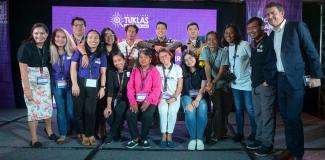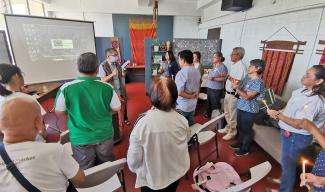Coming out popular from the TUKLAS Regional Learning Fair in February 2019, the Lasa at Kwentong Tagbanwa, or Tagbanwa Tastes and Tales, was chosen to become one of the exhibitors at the TUKLAS National Learning Fair held last 29 March 2019 at the Crowne Plaza Manila Galleria, Philippines to showcase the accomplishments of the Tagbanwa communities in the Calamianes Group of Islands. Lasa at Kwentong Tagbanwa is the banner catchphrase of the project “Enhancing Traditional Food Source Management in Disaster Preparedness in Small-Island Tagbanwa Communities” implemented by Samdhana Institute along with its partner Tagbanwa communities in Depelenged, Panlaitan, San Isidro, and Calawit islands (Palawan), funded by the TUKLAS Innovation Labs - Philippines.
Lasa. Through the project the Tagbanwas documented their traditional food sources including preparation and preservation methods. They looked into improving and innovating the traditional methods to make the food items available throughout the year especially during habagat or the typhoon season. Typhoon is identified as the major disaster risk and threatens the food security in the island communities. This premise led to conceptualizing a food security program for the Tagbanwa communities in the Calamianes islands, as part of innovating disaster risk preparedness and resilience. The project under TUKLAS ‘sowed the seeds’ for Tagbanwa women and youth to document and revive their traditional foods.
The challenge with traditional food is making them palatable and appealing to the younger Tagbanwa who have grown up exposed to the unhealthy fast food generation. Ramil Agnes, Chairman of Nurunutan yang mga Tagbanwa tung Calawit may Quezon and himself a baker, recalls the simplicity and purity of traditional food practices by their elders. He is alarmed by the unhealthy trend that Tagbanwa families now adopt. Using kurut, a wild root crop abundant in the forests, Ramil helped to innovate the traditional kurut flour for baking cookies (Krukies) and cakes. The krukies and cakes, served with Tagbanwa coffee, were offered during the National Learning Fair, to everyone’s delight.
Kwento. Josie Banotan, one of the women who was involved in the project, recounted her stories to the audience of the Fair, of her growing years when her parents inculcated the value for traditional food and hard work. She is an icon for conservation of the kurut as well as the other traditional food, many of which thrive in the garden around her house in San Isidro. She holds no position with the Panlaitan-San Isidro Cultural Minorities Development Association covering their ancestral domain but she volunteers her time to revive and promote traditional food to the other Tagbanwa communities even after the project period. She saw and was pleased with the effort of incorporating the Tagbanwa culture, along with traditional food, into the educational curriculum that was piloted with primary and secondary students in Calawit. She hopes this initiative will continue and reach more younger Tagbanwa generation.
The TUKLAS National Learning Fair expanded the horizon of support for the disaster preparedness and resilience innovation of the Tagbanwa. Chairman Ramil and Nanay Josie talked directly with other organizations, funding agencies, and business entities that showed interest in the efforts of the tribe and were interested to provide future assistance. This experience is just the beginning and more Tagbanwa communities are encouraged to follow and upscale the pilot project that had been conducted.




